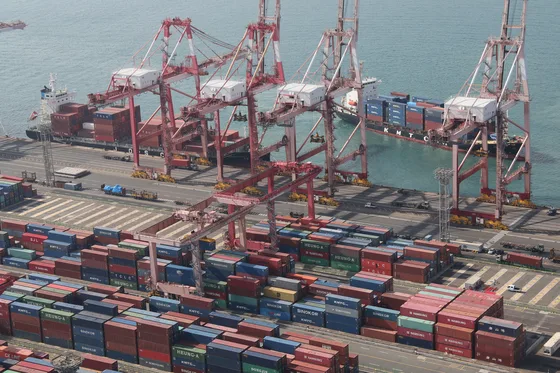
The OECD Lowers Growth Forecast for Korea as Global Economy Gets a Boost
![Container ships arrive at a port in Busan, southern Korea. [JOONGANG ILBO]](https://koreajoongangdaily.joins.com/data/photo/2024/02/05/e88a290a-d8d5-44bd-a163-66f09b4a91d0.jpg)
Container ships arrive at a port in Busan, southern Korea. [JOONGANG ILBO]
OEC Lowers Growth Forecast for Korea
The Organization for Economic Cooperation and Development (OECD) has decreased its growth forecast for Korea by 0.1 percentage points for this year. In contrast, the organization revised its projection for the global economy, increasing it by 0.2 percentage points.
Korea’s Economy Projections
The latest interim economic outlook report released by the OECD on Monday shows a lowered growth projection for Korea. It now predicts the country’s economy to grow 2.2 percent this year, a decline from its previous forecast of 2.3 percent. The 2025 projection remains unchanged at 2.1 percent. These figures align closely with the projections from the International Monetary Fund (IMF) and the Ministry of Economy and Finance for Korea.
Inflation and Global Economic Growth
The OECD anticipates a weakening of inflation in Korea this year, with a decrease to 2.7 percent and further reaching 2.0 percent by 2025. However, inflation is expected to rise among G20 nations in general. Globally, the OECD predicts a moderate but gradually slower growth pace of 2.9 percent in 2024, compared to last year’s 3.1 percent rate.
Growth Outlook for the United States
The OECD has raised its growth outlook for the United States by 0.6 percentage points, projecting a 2.1 percent growth rate. This increase is attributed to robust spending and an anticipated base rate cut.
Reasons for Slower Growth
The OECD attributes the slower on-year growth in the global economy to a loss of momentum since the end of last year. Factors such as ongoing monetary tightening and structural uncertainties in the Chinese economy contribute to this trend. Possible risk factors for the global economy in 2024 include geopolitical uncertainties in various regions, potentially leading to stronger inflation, as well as high base rates causing a debt burden.
Monetary Policy Recommendations
The OECD advises adopting a cautious approach to monetary policy to maintain downward pressure on inflation.
IMF’s Revised Forecast for Korea
The International Monetary Fund (IMF) also revised its forecast for Korea’s economic growth to 2.2 percent, down from the previous projection of 2.3 percent. This adjustment is influenced by the raised outlooks for the United States and China, which are key trading partners for Korea.
BY SHIN HA-NEE [[email protected]]